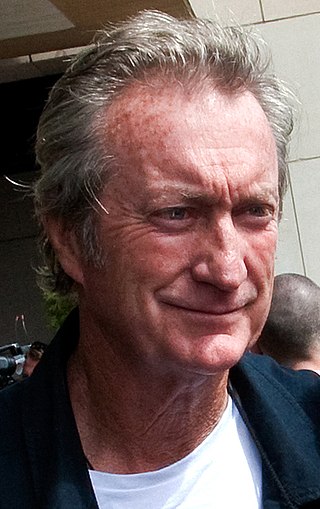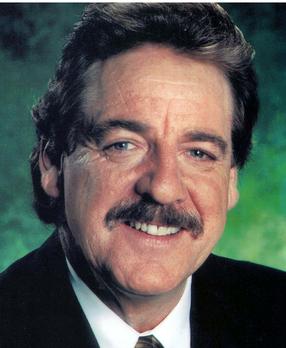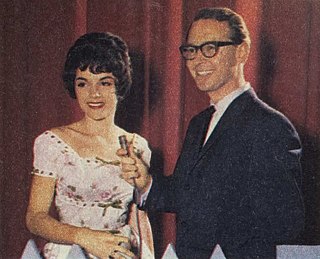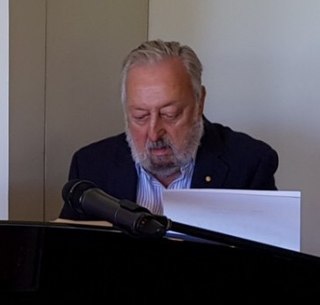Related Research Articles

Bryan Neathway Brown AM is an Australian actor. He has performed in over eighty film and television projects since the late 1970s, both in his native Australia and abroad. Notable films include Breaker Morant (1980), Give My Regards to Broad Street (1984), F/X (1986), Tai-Pan (1986), Cocktail (1988), Gorillas in the Mist (1988), F/X2 (1991), Along Came Polly (2004), Australia (2008), Kill Me Three Times (2014) and Gods of Egypt (2016). He was nominated for a Golden Globe Award and an Emmy Award for his performance in the television miniseries The Thorn Birds (1983).

Ian Bruce Turpie, sometimes referred to as Turps, was an Australian performer, actor, pop singer and presenter. He was the host of the teen pop music TV show, The Go!! Show (1965–66) and various TV game shows, The Price Is Right, and Supermarket Sweep (1992–1994). As a TV actor he portrayed Keith Warne on Swift and Shift Couriers and Wazza and Narrator in Housos (2011). He was diagnosed with oesophageal cancer in 2011 and died in the following year, aged 68.
Leslie William Morrison, known professionally as Lucky Starr, is an Australian pioneer rock and roll, pop and country music singer, guitarist and television presenter. His most popular single, "I've Been Everywhere", appeared in early 1962, which peaked at number one in Sydney. Starr became well known through his many TV appearances on show's such as Bandstand and Six O'Clock Rock, in which he briefly hosted taking over from Johnny O'Keefe, he was the first star to entertain troops in Vietnam.
Barry John Stanton was an English-Australian rock and roll musician. He performed on pop music programs, Six O'Clock Rock, Bandstand, Johnny O'Keefe Show, Sing Sing Sing, Saturday Date, and Woody's Teen Time. He issued a compilation album, A Tribute to the King Rare Songs 1957-1965, in 1988.

Richard Ernest May was a New Zealand-born jazz singer and musician, best known for singing cover versions of numerous pop songs or jazz standards. He moved to Australia in 1962 where he worked mainly in theatre and cabaret and had TV appearances on The Don Lane Show, The Midday Show and Hey Hey It's Saturday, as well as taking over hosting from Mike Walsh on pop music show Ten on the Town
Yvonne Frances Barrett was an Australian pop singer. She reached the top 60 Kent Music Report singles chart with her cover versions of Petula Clark single "You're the One"/"Little People", in October 1965. She released other singles in that, and the following, decade. Barrett also appeared on TV shows in the 1960s and 1970s. She became a session singer and performed on the club circuit. Barrett married Hoang Van Truong, a former Vietnam War veteran, in December 1983; the couple separated in the following year. Truong was found guilty of Barrett's 1985 murder and was sentenced to life imprisonment without parole, in August 1986.

Bandstand is an Australian live pop music, variety television program screened from November 1958 to June 1972. Featuring both local and international music artists, and produced in-house at the studios of the Nine Network in Willoughby, New South Wales, it was originally broadcast only in New South Wales, It became a national program in the early 1960s as the network expanded into other Australian states. The host of Bandstand for its entire existence was radio presenter and television newsreader Brian Henderson.

Diana Roselyn Trask is an Australian-born country and pop singer. In the early 1960s she was a regular pop music performer on United States TV shows, Don McNeill's Breakfast Club and Sing Along with Mitch. From 1968 to 1981 she was a country music singer in the US and in Australia. In the US, she had eighteen singles on the Billboard Hot Country Songs chart, where her top 20 hits are "Say When" and "It's a Man's World ", "When I Get My Hands on You" and "Lean It All on Me". In January 1962 she married Thom Ewen, a Connecticut businessman, to become Diana Ewen. In the 1980s Trask withdrew from performing to look after Ewen, who had had a stroke: he subsequently died in 2009. The couple have two children. Trask co-authored her autobiography, Whatever Happened to Diana Trask: A Memoir, with Alison Campbell Rate, on 1 May 2010.
Judith Anne Stone AM is an Australian pop and country music singer. For much of the 1960s she was a regular performer on the music variety Bandstand, Stone's top 20 singles on the national charts are "I'll Step Down", "4,003,221 Tears from Now", "Born a Woman" and "Would You Lay with Me". On the Queen's Birthday Honours List of June 2006, Stone was awarded a Member of the Order of Australia, with the citation, "For service to the community as an entertainer at fundraising events for a range of charitable organisations, and as a singer."
Donald Sutherland OAM is an Australian radio and television presenter. He was the host of TV pop music show Sounds between 1975 and 1987. Sutherland has also worked as a TV producer and music journalist, and is associated with the local greyhound racing industry.

Jacqueline Ruth Weaver is an Australian theatre, film, and television actress. Weaver emerged in the 1970s as a symbol of the Australian New Wave through her work in Ozploitation films such as Stork (1971), Alvin Purple (1973), and Petersen (1974). She later starred in Picnic at Hanging Rock (1975), Caddie (1976), Squizzy Taylor (1982), and a number of made-for-television movies, miniseries, and Australian productions of revered plays such as Death of a Salesman and A Streetcar Named Desire.

Digby George "Dig" Richards was an Australian rock and roll singer, songwriter, instrumentalist, musical theatre actor and television presenter, active during the late 1950s and early 1960s as lead singer with the R'Jays. Richards was the first Australian rock and roll artist to record a 12" LP record in Australia, with the self-titled album Dig Richards, released in November 1959. From 1971 he performed as a solo country music artist. According to the Kent Music Report he had four Top 30 national hit singles, "(My) Little Lover" / "Quarrels ", "A Little Piece of Peace", "People Call Me Country" / "The Dancer", and "Do the Spunky Monkey". On 17 February 1983 Digby Richards died of pancreatic cancer, aged 42. He was survived by his wife, Sue and two children.
Lorraine May Chapman, professionally known as Laurel Lea, was an Australian popular singer of the late 1950s and early 1960s. Lea appeared regularly on TV series, Bandstand, Six O'Clock Rock and Saturday Date. In 1974 and 1975 she toured throughout Australia with contemporaries Johnny O'Keefe, Johnny Devlin, Lonnie Lee and Barry Stanton. On 31 January 1992 Lea died of leukaemia.

The Patriots was an Australian television drama mini-series. A period-drama, it aired for 10 episodes on ABC in 1962.
Christopher Muir was an Australian director and producer, notable for his work in TV in the 1950s and 1960s. In the 1980s he was head of ABC Television drama.
Rodney Scott Kinnear was an Australian director, best known for his work in TV.
The BP Super Show was an Australian television series of loosely scheduled TV specials often of the variety show genre, which aired from circa 1959 to circa 1970. The programs often featured international performers that were touring Australia. It originally aired on ATN-7 in Sydney and GTV-9 in Melbourne, with the production of episodes varying between the two stations, and it also aired on other stations across Australia. It aired on the Nine Network after the formation of that network. Given the varied nature of the episodes, critical reception varied, but was often very positive, with a 1961 episode with Ella Fitzgerald being called by The Age newspaper "one of the best shows of its type presented on Melbourne TV".
John Anthony Patrick Hurley OAM, who performs as Jade Hurley, is an Australian country music singer-songwriter and pianist. Hurley's hit singles are "How I Lied" (1965), "Down in the Riverina" (1974) and "Another Saturday Night" (1982). He was a regular performer on TV including on The Mike Walsh Show in the 1970s to early 1980s. In June 1998 he was awarded the Order of Australia Medal, "for service to the entertainment industry and to the community, particularly in the area of fund raising for groups including the arthritis foundation of NSW, the Australian Cancer Foundation for medical research and Camp Quality."
Leo de Kroo is an Australian pop and country music singer, and an accomplished luthier. For much of the 1960s he was a regular performer on Bandstand, a pop music TV show, hosted by Brian Henderson. De Kroo was one half of The De Kroo Bros. As The De Kroo Bros, they also appeared on other pop music shows.

Geoffrey John Harvey was an English-Australian musician, pianist, conductor, musical director and television personality who worked at the Australian Nine Network for 38 years. Known primarily for his appearances on The Mike Walsh Show and Midday, Harvey also composed a number of the theme songs for the network's programs.
References
- 1 2 3 4 5 6 7 8 9 10 11 12 13 McFarlane, Ian (31 March 2017). "Encyclopedia entry for 'Bryan Davies'". The Encyclopedia of Australian Rock and Pop . Jenkins, Jeff (Foreword) (2nd ed.). Gisborne, VIC: Third Stone Press (published 2017). pp. 123–124. ISBN 978-0-9953856-0-3.
- 1 2 "Bryan Davies". The First Decade of Rock. 29 October 2013. Archived from the original on 29 October 2013. Retrieved 18 September 2018.
- 1 2 3 Munday, Winifred (1 January 1964). "Top recording stars In surf musical play". The Australian Women's Weekly. Teenagers' Weekly. Vol. 31, no. 31. p. 7. Retrieved 17 September 2018– via National Library of Australia.
- ↑ Musgrove, Nan (7 March 1962). "World at his feet—at 17". The Australian Women's Weekly. Teenagers' Weekly. Vol. 29, no. 40. p. 4. Retrieved 17 September 2018– via National Library of Australia.
- ↑ Jeff, Ron. "Top 40" . Retrieved 17 September 2018.
- ↑ Nuttall, Lyn. "'Dream Girl' – Bryan Davies (1961)". Where did they get that song?. PopArchives – Sources of Australian Pop Records from the 50s, 60s and 70s (Lyn Nuttall). Archived from the original on 4 May 2016. Retrieved 17 September 2018.
- ↑ "Bandstand's Lucky 13". The Australian Women's Weekly. Teenagers' Weekly. Vol. 29, no. 27. 6 December 1961. p. 7. Retrieved 18 September 2018– via National Library of Australia.
- ↑ "ACE Repertory – Title: 'Five Foot Two Eyes of Blue'". American Society of Composers, Authors and Publishers (ASCAP). Retrieved 17 September 2018. Note: user may have to enter the title/performer for other tracks to access further information.
- 1 2 "Final Bryan Davies Show". The Canberra Times . Vol. 38, no. 10, 725. 21 December 1963. p. 18. Retrieved 17 September 2018– via National Library of Australia.
- 1 2 "Blackwater Trail to Butterfly Island". Memorable TV Australian Shows. Archived from the original on 19 June 2009. Retrieved 17 September 2018.
- ↑ "About Us: Jay Justin". Jay Justin. Archived from the original on 29 August 2008. Retrieved 17 September 2018.
- ↑ Kimball, Duncan (2004). "Anything Goes". Milesago: Australasian Music and Popular Culture 1964–1975. Ice Productions. Archived from the original on 14 March 2010. Retrieved 18 September 2018.
- ↑ Latreille, Anne (4 June 1969). "Theatre 'A Place of Escape' Says Bryan". The Age . p. 9. Retrieved 18 September 2018.
- ↑ "Movie Guide". The Australian Women's Weekly. TV World. Vol. 48, no. 46. 22 April 1981. p. 169. Retrieved 20 September 2018– via National Library of Australia.
- ↑ "Johnny O'Keefe – Today – A Sydneybiz.com project". Johnny Rock 'n' Roll. Retrieved 17 September 2018. Note: this site incorrectly refers to Brian Davies.
- ↑ "Golden Boys of Aussie Rock 'n' Roll". Roland Storm Website. Archived from the original on 26 November 2009. Retrieved 18 September 2018.
- ↑ "Christmas Pantomime". The Australian Women's Weekly. Teenagers' Weekly. Vol. 30, no. 30. 26 December 1962. p. 2. Retrieved 17 September 2018– via National Library of Australia.
- ↑ Weaver, Jacki (2005). Much Love, Jac X. Allen & Unwin. ISBN 978-1-74114-618-9.
- ↑ "Event: A Wish Is a Dream". AusStage . Retrieved 18 September 2018.
- ↑ Best, Betty (27 May 1964). "Bryan Davies". The Australian Women's Weekly. Vol. 31, no. 52. p. 8. Retrieved 17 September 2018– via National Library of Australia.
- ↑ Yates, Kerry (14 October 1964). "Whatever Happened to Bryan Davies?". The Australian Women's Weekly. Vol. 32, no. 20. p. 94. Retrieved 17 September 2018– via National Library of Australia.
- ↑ Musgrove, Nan (5 November 1975). "'Happy Days of Bandstand'". The Australian Women's Weekly. Vol. 43, no. 23. p. 9. Retrieved 20 September 2018– via National Library of Australia.
- ↑ Kimball, Duncan (2002). "Record Labels – His Master's Voice (HMV)". Milesago: Australasian Music and Popular Culture 1964–1975. Ice Productions. Archived from the original on 14 March 2010. Retrieved 18 September 2018.
- ↑ Kimball, Duncan (2002). "Record Labels – Columbia Records (Australia". Milesago: Australasian Music and Popular Culture 1964–1975. Ice Productions. Archived from the original on 14 March 2009. Retrieved 18 September 2018.
- ↑ "Dorothy's sights are set on the U.S." The Australian Women's Weekly. Teenagers' Weekly. Vol. 30. 14 November 1962. p. 7. Retrieved 18 September 2018– via National Library of Australia.
- ↑ Nuttall, Lyn. "'Raincoat in the River' – Dig Richards and the R'Jays (1964)". Where did they get that song?. PopArchives – Sources of Australian Pop Records from the 50s, 60s and 70s (Lyn Nuttall). Archived from the original on 4 July 2007. Retrieved 18 September 2018.Note: also describes Davies' cover version, which is the b-side of "Tell the Other Guy".